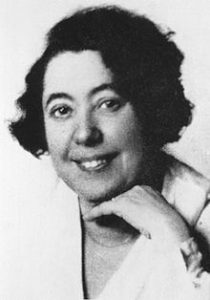This is year 1925 and the European scientific community is under shock – Lina Stern, pioneer of neuroscience, a well-known researcher and the first female professor at the Geneva University, changes comfortable Switzerland for the USSR, a country still in ruins, without possibility for experimental scientific work. And this at the moment when Russian intelllectuals try to run away from the paradise of workers and peasants to the capitalist jungle.
« Why? » her colleagues are stunned. « It seems that you have come to Geneva just because the sweet Russia had rejected you as Jewish and a woman! «

The future scientific star sees the world in 1878 in a prosperious intellectual Jewish famiily in Latvia, at the time a part of the Russian Empire. Her mother-tongue is German. The girl is called Liebe-Leah, but later she « modernises » her name for Lina, euphonic with Alina et Paulina, and also because in ancient Greek “linos” means “a sad song”. Her father Solomon Stern studies medecin at the University of Konigsberg, but later becomes a successful businessman. Her parents are emancipated and not practicing Judaism; nonetheless, until the age of 8 Lina lives with her grandfather, a rabbi.
Après a German Gymnasium, Lina chooses the Moscow University. But at this time russian universities do not yet accept women and and Jews and all the eforts of Solomon Stern to get an exception for his daughter, are in vain. Lina turns to the Zurich University, but it is already on the « black list » of the Tsar government, as a source of revolutionary viruses. University of Geneva is not there yet and in 1898 Lina starts her medical studies in Geneva, where about 40% of the students are Jewish girls from Russia, certainly mostly from prosperious families.
Lina studies well and starts a research, being influenced by her compatriot Alexei Bach, a professor of biochemistry, exiled in Geneva for his revolutionary activities.
In 1904, she get her medical Diploma and leaves for Russia, hoping to get a place of a village doctor. But soon, in 1905, Lina’s ex-professor in Geneva Dr Prévost offers to her a position of his assistant. Lina comes back and restarts her research in physiology. The results are so impressive that ten years later Ms Stern is accepted as the first female professor at the University of Geneva. Sadly, prejudices are still there and the career of this outstanding ambitious lady, and moreover a Russian Jewess, is not a long quiet river.
But professor Stern feels also an ideological pressure from the Tche-Ka (precursor of the KGB) agents and from her friend professor Bach, now a key figure at the Soviet Academy of Sciences. They describe to her the Bolchevick kingdom as a new promised land, flowing with milk and honey, and pledge anything she could dream of.
Lina is far from politics, though she knows many Russian revolutionary exiles, in particular George Plekhanov, ex Lenin’s mentor. Even Haim Weitzmann, her friend and colleague at the Geneva University, does not succeed to convert her to Zionism. There is a rumour that Staline in person is interested by her research, hoping that she could extend his life term. Anyway, the die is cast and soon professor Stern moves to Moscow, shocking the international scientific community.

In URSS, Lina Stern leads a lot of scientific activities – she directs numerous scientific institutes and centres and is apprecialted by her colleagues and by Stalin personally. She becomes the first female member of the Soviet Academy of sciences and does a lot to attract young women to science.
During the World War II, Lina Stern is a member of the Soviet Jewish Antifascist Committe, an USSR showcase created by Stalin to get money from American Jewish organisations. Soon (in 1943) she realises the amplitude of Soviet anti-Semitism and writes about it to Stalin. The letter does not receive any answer.
Medecins created by Lina Stern save thousands of lifes of wounded Soviet soldiers.
The Cold War starts and during the famous anti-Semitic campaing in URSS, professor Stern is arrested as « an agent of American sionism » and is put to trial together with all the the Soviet Antifascist Committee. Lina Stern is the only one to escape the death punishment – rumours say that she is saved by Stalin in person, who still hopes that she could make him immortal. She is sent to an exile in a lost village in Central Asia.
In 1953, after Stalin’s death Lina Stern is brought back to Moscow and can re-start her activities. She continues her research, in spite of her weak health condition after the exile. From now on she does not hesitate to criticise the hypicritical treatment of Jews by the Soviet Government. She feels herself more Jewish than ever before.
Lina Stern passes away in 1968, an author of 250 scientific articles, glorified internationally as a pioneer of neurosciences.
Single, without children, she often repeats a Yiddish saying “Man tracht und Got lacht.”
A rumous says that in Geneva she was engaged to a British colleague. Lina broke the engagement after her Prince Charmant confessed that in their future he saw her as a houswife. Both of them kept their love until the end of their days and remained single.
Lina Stern is buried in Moscow at the Goverment cemetery Novodevichy.
Her ”linos”, the song of her life, is as sad as magnificent.
The memory of Lina Stern, a famous scientist and the first female profesor of Geneva University, is still present in Geneva – l’EVE (the University child Center) as well as one of the building of the Geneva Hospital, bear her name. Non omnis moriar.




